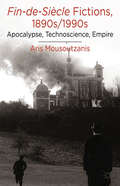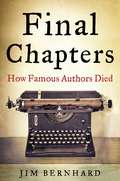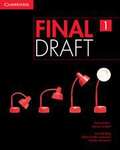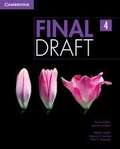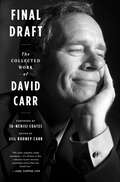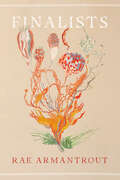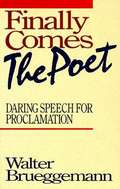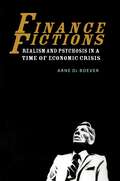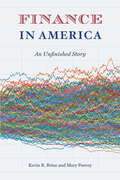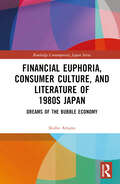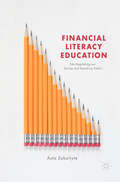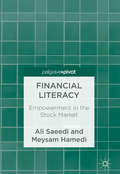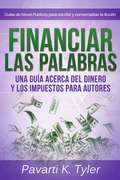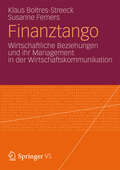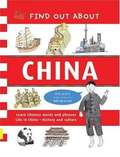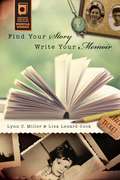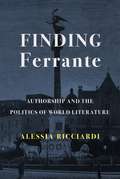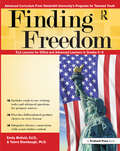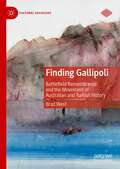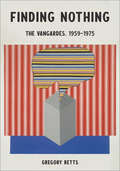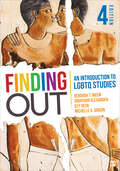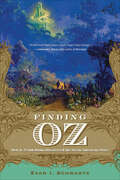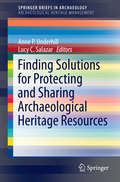- Table View
- List View
Fin-de-Siècle Fictions, 1890s-1990s: Apocalypse, Technoscience, Empire
by A. MousoutzanisFin-de-Siècle Fictions, 1890s- 1990s focuses on fin-de-siècle British and postmodern American fictions of apocalypse and investigates the ways in which these narratives demonstrate shifts in the relations among modern discourses of power and knowledge.
Final Chapters: How Famous Authors Died
by Jim Bernhard"Everybody has got to die, but I have always believed an exception would be made in my case.” -William Saroyan, Pulitzer Prize-winning authorFamous authors, like everybody else, know that one day they will die. Final Chapters tells the fascinating stories of more than one hundred writers’ encounters with death-and their attitudes toward the Grim Reaper: fear, uncertainty, or acceptance.Francis Bacon wrote, "It is as natural to die as to be born,” while Socrates told the judges who condemned him, "And now we go our ways, I to die and you to live. Which is better is known to God alone.”Death often came in startling ways for these well-known writers. The playwright Aeschylus was conked by a turtle falling from the sky. Christopher Marlowe was stabbed in a barroom brawl. Molière collapsed while playing the role of a hypochondriac in one of his plays.Edgar Allan Poe was found semicomatose in someone else’s clothes shortly before he died. Sherwood Anderson was felled by a toothpick in a martini. Did Dylan Thomas really die of eighteen straight whiskeys? And was it a bottle cap or murder that did in Tennessee Williams?If these authors have lessons for us, the best may be that of Marcus Aurelius: "Death smiles at us all; all we can do is smile back.”
Final Draft 1
by Pamela Hartmann Robyn Brinks Lockwood David Bohlke Wendy AsplinAcademic writing is difficult, and Final Draft gives students all the tools they need. Writing skills and in-depth analysis of models set the stage for development. Corpus-based vocabulary, collocations, and phrases, as well as detailed information on the grammar of writing, prepare your learners for college writing courses. Students learn to avoid plagiarism in every chapter of every level. This dedicated, long-term focus on plagiarism avoidance helps ensure that these students are able to use sources and highlight their own thoughts.
Final Draft 4
by Wendy Asplin Monica F. Jacobe Alan S. Kennedy Lindsay HansenAcademic writing is difficult, and Final Draft gives students all the tools they need. Writing skills and in-depth analysis of models set the stage for development. Corpus-based vocabulary, collocations, and phrases, as well as detailed information on the grammar of writing, prepare your learners for college writing courses. Students learn to avoid plagiarism in every chapter of every level. This dedicated, long-term focus on plagiarism avoidance helps ensure that these students are able to use sources and highlight their own thoughts.
Final Draft: The Collected Work of David Carr
by David Carr“A revelatory collection reminding us of what journalism used to be—and what it ought to be.” —Kirkus Reviews (starred review)Throughout his twenty-five-year career, David Carr was noted for his sharp and fearless observations, his uncanny sense of fairness and justice, and his remarkable compassion and wit. His writing was informed both by his own hardships as an addict and his intense love of the journalist’s craft. His range—from media politics to national politics, from rock ‘n’ roll celebrities to the unknown civil servants who make our daily lives function—was broad and often timeless. Edited by his widow, Jill Rooney Carr, and with an introduction by one of the many journalists David Carr mentored, Ta-Nehisi Coates, Final Draft is a career-spanning selection of the legendary reporter’s writing for the New York Times, Washington City Paper, New York Magazine, the Atlantic, and more.“Wit, style, empathy, tough questions—it’s all here, in this collection by the one-man journalism school that was David Carr . . . Final Draft allows us to read decades of David’s best reportage about corruption, racism, celebrity, addiction, disease, and his love for his family, his skills only outdone by his humanity.” —Jake Tapper, CNN Chief Washington Correspondent
Finalists (Wesleyan Poetry Ser.)
by Rae ArmantroutA double book by Pulitzer Prize winning poet Rae Armantrout What will we call the last generation before the looming end times? With Finalists Rae Armantrout suggests one option. Brilliant and irascible, playful and intense, Armantrout nails the current moment's debris fields and super computers, its sizzling malaise and confusion, with an exemplary immensity of heart and a boundless capacity for humor. The poems in this book find (and create) beauty in midst of the ongoing crisis. CONTRAST What's to like if not contrast? Shadows beneath the model's sharp cheekbones, her ample yet precise lips. Clean lines separating bounty from its opposite. This is not what I want to want. These eyes on the hypothetical distance.
Finally Comes the Poet: Daring Speech for Proclamation
by Walter BrueggemannFour lectures on preaching as a subversive activity, in which scripture, preacher and community are brought together to "voice a new world".
Finance Fictions: Realism and Psychosis in a Time of Economic Crisis
by Arne De BoeverFinance Fictions takes the measure of what it means to live in a world ruled by high finance by examining the tension between psychosis and realism that plays out in the contemporary finance novel. When the things traded at the center of the economy cease to be things at all, but highly abstracted speculations, how do we come to see the real? What sorts of narrative can accurately approach the actual workings of a neoliberal economy marked by accelerating cycles of market crashes, economic and political crisis, and austerity?Revisiting such twentieth-century classics of the genre as Tom Wolfe's Bonfire of the Vanities and Bret Easton Ellis’s American Psycho, De Boever argues that the twenty-first century is witnessing the birth of a new kind of realistic novel that can make sense of complex financial instruments like collateralized debt obligations, credit default swaps, and digital algorithms operating at speeds faster than what human beings or computers can record. If in 1989 Wolfe could still urge novelists to work harder to “tame the billion-footed beast of reality,” today’s economic reality confronts us with a difference that is qualitative rather than quantitative: a new financial ontology requiring new modes of thinking and writing.Mobilizing the philosophical thought of Quentin Meillassoux in the close reading of finance novels by Robert Harris, Michel Houellebecq, Ben Lerner and less well-known works of conceptual writing such as Mathew Timmons’ Credit, Finance Fictions argues that realism is in for a speculative update if it wants to take on the contemporary economy—an “if” whose implications turn out to be deeply political. Part literary study and part philosophical inquiry, Finance Fictions seeks to contribute to a new mindset for creative and critical work on finance in the twenty-first century.
Finance in America: An Unfinished Story
by Kevin R. Brine Mary PooveyThe economic crisis of 2008 led to an unprecedented focus on the world of high finance—and revealed it to be far more arcane and influential than most people could ever have imagined. Any hope of avoiding future crises, it’s clear, rest on understanding finance itself. To understand finance, however, we have to learn its history, and this book fills that need. Kevin R. Brine, an industry veteran, and Mary Poovey, an acclaimed historian, show that finance as we know it today emerged gradually in the late nineteenth century and only coalesced after World War II, becoming ever more complicated—and ever more central to the American economy. The authors explain the models, regulations, and institutions at the heart of modern finance and uncover the complex and sometimes surprising origins of its critical features, such as corporate accounting standards, the Federal Reserve System, risk management practices, and American Keynesian and New Classic monetary economics. This book sees finance through its highs and lows, from pre-Depression to post-Recession, exploring the myriad ways in which the practices of finance and the realities of the economy influenced one another through the years. A masterwork of collaboration, Finance in America lays bare the theories and practices that constitute finance, opening up the discussion of its role and risks to a broad range of scholars and citizens.
Financial Euphoria, Consumer Culture, and Literature of 1980s Japan: Dreams of the Bubble Economy (Routledge Contemporary Japan Series)
by Ikuho AmanoThis book is an interdisciplinary study of Japan during the socially euphoric years of the Bubble Economy in the 1980s. Shedding light on consumer experiences, this study explores the socio-cultural landscape of Japan, the nation that boasted the second largest economy in the late twentieth century. Drawing its analysis from various media sources, popular literary works, and public reports, the book articulates how the late 1980s calibrated consumer demands, lifestyles, and perceptions of wealth. Through an examination of the qualitative effects of ‘Bubble money’ on consumers, the book disentangles the anatomy of the festive ambience in the economic phase, closely reading fictional and non-fictional literary works that play the role of reportage, critique, and satire. Through observations of human behaviours in consumption, the book reveals psychosomatic experiences and self-consciousness. Featuring a wide range of sources from Japanese media and literary works which have yet to be translated for an English audience, this book will be a valuable resource for students and scholars of modern Japanese culture and literature who are interested in the socio-economic landscape of late-twentieth-century Japan.
Financial Literacy Education
by Asta ZokaityteThis book explores the issue of consumer financial education, responding to increased interest in, and calls to improve peoples' financial literacy skills and abilities to understand and manage their money. New conceptual frameworks introduced in the book offer academic audiences an innovative way of thinking about the project on financial literacy education. Using the concepts of 'edu-regulation' and 'financial knowledge democratisation' to analyse the financial education project in the UK, the book exposes serious, and often ignored, limitations to using information and education as tools for consumer protection. It challenges the mainstream representation of financial literacy education as a viable solution to consumer financial exclusion and poverty. Instead, it argues that the project on financial literacy education fails to acknowledge important dependences between consumer financial behaviour and the socio-economic, political, and cultural context within which consumers live. Finally, it reveals how these international and national calls for ever greater financial education oversimplify and underestimate the complexity of consumer financial decision-making in our modern times.
Financial Literacy: Empowerment In The Stock Market
by Ali Saeedi Meysam HamediThis book provides an overview of current issues associated to financial literacy improvement. In selecting and structuring the material to include, the primary criterion has been applicability of topics and recommendations and accuracy of trends toward better financial literacy level. Each chapter is dedicated to a particular component of financial literacy from education to capability.Throughout the book, there are many practices initiated around the world which, regardless of their superiority, are all useful initiatives and can roll play as a spot light in the road of improvement for both investors and authorities. This book is not only applicable for academics and students, but authorities who aim to improve financial literacy (and subsequently financial capability) among individuals and for those investors who seek to improve their own financial literacy.
Financiar las palabras: Una guía acerca del dinero y los impuestos para autores
by Alma Edith Garcia Pavarti K. TylerOrganizar tus finanzas personales significa ganar más dinero y ¿quién no quiere ganar más dinero? Los escritores tienden a ser personas con facilidad para las palabras, ¡lo que significa que la temporada de pago de impuestos puede causarles mucha angustia! ¿Has estado tomando todas las medidas necesarias para asegurarte de que puedas maximizar tu devolución? ¿Estás guardando todos tus recibos en una caja de zapatos? ¿Tienes pesadillas llenas de signos de dólares flotando en el aire y mientras te preocupas por todo el dinero que vas a deber después de que por fin termines de declarar impuestos? ¡ Financiar las palabras está aquí para ayudarte! Prepárate para aprender todo lo que jamás hayas necesitado aprender sobre operar tu propio negocio y declarar impuestos como autor y a dedicar tan sólo unas horas a preparar tus registros. Con Pavarti K. Tyler como tu guía, harás un recorrido por los números, aprenderás cuáles gastos son deducibles y cuáles no, te enterarás de trucos para preparar tu empresa como autor y recibirás recomendaciones innovadoras para aplicar tu talento y agregar un poco más de grosor a tu alcancía. Con este guía, recibirás explicaciones prácticas y fáciles de entender acerca de cómo organizar y como administrar tus finanzas, incluyendo: Cómo ser un emprendedor exitoso La regla de impuestos #1 que tienes que saber Ganar dinero y qué hacer con él Los pros y contras de establecer una sociedad Los pagos a diseñadores, editores y otros contratistas Preguntas frecuentes Maximizar tus deducciones Determinar cuáles son tus bienes o activos Ganar dinero por gastar dinero Contratar a un profesional de impuestos o presentar tu declaración tú mismo ¡También ofrecemos nueve regalos exclusivos para los lectores de este libro! Nuestra garantía: ¿Estás cansado de examinar meticulosamente las guías de marketing que se centran más en la experienc
Finanztango
by Klaus Boltres-Streeck Susanne FemersWirtschaftskommunikation ist eine vielfältige Managementaufgabe. Gegenstände der Steuerung sind zweifelsohne die Inhalte und Instrumente der Kommunikation. Management in der Wirtschaftskommunikation bedeutet aber mehr: Vielfältige Beziehungen der Akteure im Kommunikationsprozess sind von Kommunikationsmanagern aktiv und bewusst zu gestalten. Im "Finanztango" dieser Wirtschaftsbeziehungen sind daher für zielorientierte Kommunikation die Parkettbeschaffenheit zu prüfen, die gemeinsamen Schrittfolgen genau zu planen und mögliche Hindernisse abzuschätzen. Dieses Buch bündelt und systematisiert Wissen zum Beziehungsmanagement, damit die Pflicht nicht zur Bürde und die Kür ohne Abzug in der B-Note absolviert wird .
Find Out About China: Learn Chinese Words And Phrases And About Life In China (Find Out About Books)
by Zheng Qing Tim HutchinsonEach Find Out About book introduces boys and girls to a different country, its people, its history, its culture, and its language. The books are divided into four parts:
Find Your Story, Write Your Memoir
by Lynn C. Miller Lisa Lenard-CookEvery person has a story to tell, but few beginners know how to uncover their story's narrative potential. And despite a growing interest among students and creative writers, few guides to the genre of memoirs and creative nonfiction highlight compelling storytelling strategies. Addressing this gap, authors Lynn C. Miller and Lisa Lenard-Cook provide a compact, accessible guide to memoir writing that shows how an aspiring memoir writer can use storytelling tools and tactics borrowed from fiction to weave personal experiences into the shape of a story. Find Your Story, Write Your Memoiroffers an overview of the building blocks of memoir writing. Individual chapters focus on key issues and challenges, such as the balance between the remembering narrator and the experiencing narrator, the capacity to honor the subjective voice, the occasion of telling (why does this narrator tell this storynow?), creating an organically functional structure for a particular story, and taking the next steps with a written memoir. Drawing on their combined years of experience teaching memoir writing, authoring works of fiction and nonfiction, and working in autobiographical performance, Miller and Lenard-Cook provide a practical guide whose core philosophy is motivated by a key word:story.
Find Your Way (Reach Into Phonics Ser.)
by Deborah J. Short Chris Medrick John GrigsbyNIMAC-sourced textbook
Finding Ferrante: Authorship and the Politics of World Literature
by Alessia RicciardiElena Ferrante’s Neapolitan novels achieved stunning global success in part because of the mystery surrounding their pseudonymous author. English-speaking readers were tantalized by her enigmatic biography as well as what they took to be her authentic portrayal of working-class Naples. However, we now know that the person behind the writing is most likely Anita Raja, a prominent translator of German literature whose background is very different from Ferrante’s supposed life.In Finding Ferrante, Alessia Ricciardi revisits questions about Ferrante’s identity to show how the problem of authorship is deeply intertwined with the novels’ literary ambition and politics. Going beyond the local and national cultures of Naples and Italy, Ricciardi reads Ferrante’s fiction as world literature, foregrounding Raja’s work as a translator. She examines the novels’ engagement with German literature and criticism, particularly Goethe, Walter Benjamin, and Christa Wolf, while also tracing the influence of Italian thinkers such as Antonio Gramsci, Carla Lonzi, and the Milan Women’s Bookstore Collective. Considering central questions of sexuality, work, politics, and place, Ricciardi demonstrates how intertextual resonances reshape our understanding of Lila and Elena, the protagonists of the Neapolitan Quartet, as well as the characters and language of Ferrante’s other books.This bold reconsideration of one of today’s most acclaimed authors reveals Ferrante’s works as fiercely intellectual, showing their deep concern with feminist and cultural politics and the ethical and political stakes of literature.
Finding Freedom: ELA Lessons for Gifted and Advanced Learners in Grades 6-8
by Tamra Stambaugh Emily MofieldFinding Freedom invites students to follow America's journey toward finding freedom by examining multiple perspectives, conflicts, ideas, and challenges through seminal historical texts. This unit, developed by Vanderbilt University's Programs for Talented Youth and aligned to the Common Core State Standards (CCSS), features close readings of some of the most famous American political speeches from notable Americans, presidents, and minority voices. To sharpen historical thinking, students analyze arguments for freedom, examine dissenting perspectives, and reason through multiple viewpoints of historical issues through debates and interactive activities. To develop advanced literacy skills, students evaluate effective rhetorical appeals, claims, supporting evidence, and techniques that advance arguments. Students synthesize their learning by comparing speeches to each other, relating texts to contemporary issues of today, and making interdisciplinary connections. Lessons include close readings with text-dependent questions, choice-based differentiated products, rubrics, formative assessments, social studies content connections, and ELA tasks that require argument and explanatory writing. Ideal for pre-AP and honors courses, the unit features speeches from Patrick Henry, Frederick Douglass, Carrie Chapman Catt, and Presidents Franklin D. Roosevelt, Lincoln, Kennedy, Johnson, George W. Bush, Obama, and others. Grades 6-8
Finding Gallipoli: Battlefield Remembrance and the Movement of Australian and Turkish History (Cultural Sociology)
by Brad WestThis book is about how Australian and Turkish historical understanding of the First World War Gallipoli Campaign has been shaped by travel to the battlefield for the purposes of commemoration. Utilizing a cultural historical method, the study begins with examining how cultural conceptions of travel influenced the experience of those fighting in the 1915 Battle, and ends with the way that new global insecurities and the withdrawal of Western troops from Afghanistan in 2021 is reflecting and influencing Australia and Turkey’s social memory of their military past. This wide historical lens and the author’s original fieldwork and analysis of documents allows for an in-depth exploration of the ways in which cultural patterns of social memory develop over time and mapping of how specific cultural representations in the past are reclaimed. The book argues that travel is a key factor influencing social change by providing distinctive ritual experiences that afford unique, discursive opportunities and empowering particular carriers and custodians of social memory.
Finding Nothing: The VanGardes, 1959-1975
by Gregory BettsExperimental literature accelerated dramatically in Vancouver in the 1960s as the influence of New American poetics merged with the ideas of Marshall McLuhan. Vancouver poets and artists began thinking about their creative works with new clarity and set about testing and redefining the boundaries of literature. As new gardes in Vancouver explored the limits of text and language, some writers began incorporating collage and concrete poetics into their work while others delved deeper into unsettling, revolutionary, and Surrealist imagery. There was a presumption across the avant-garde communities that radical openness could provoke widespread socio-political change. In other words, the intermedia experimentation and the related destruction of the line between art and society pushed art to the frontlines of a broad socio-political battle of the collective imagination of Vancouver. Finding Nothing traces the rise of the radical avant-garde in Vancouver, from the initial salvos of the Tish group, through Blewointment’s spatial experiments, to radical Surrealisms and new feminisms. Incorporating images, original texts, and interviews, Gregory Betts shows how the VanGardes signalled a remarkable consciousness of the globalized forces at play in the city, impacting communities, orientations, races, and nations.
Finding Out: An Introduction to LGBTQ Studies
by Deborah T. Meem Michelle A. Gibson Jonathan F. Alexander Key BeckFinding Out, Fourth Edition introduces readers to lesbian-gay-bisexual-transgender-queer (LGBTQ) studies. By combining accessible introductory and explanatory material with primary texts and artifacts, this text/reader explores the development and growth of LGBTQ identities and the interdisciplinary nature of sexuality studies. Now available in a digital ebook format, the fourth edition has been thoroughly updated to include a new chapter on "Trans Lives and Theories", and new readings. Chapters include more discussions of important and current issues in LGBTQ studies such as the emergence of non-binary identities, and issues of race and class, making Finding Out, Fourth Edition an even more comprehensive introduction to the field.
Finding Out: An Introduction to LGBTQ Studies
by Deborah T. Meem Michelle A. Gibson Jonathan F. Alexander Key BeckFinding Out, Fourth Edition introduces readers to lesbian-gay-bisexual-transgender-queer (LGBTQ) studies. By combining accessible introductory and explanatory material with primary texts and artifacts, this text/reader explores the development and growth of LGBTQ identities and the interdisciplinary nature of sexuality studies. Now available in a digital ebook format, the fourth edition has been thoroughly updated to include a new chapter on "Trans Lives and Theories", and new readings. Chapters include more discussions of important and current issues in LGBTQ studies such as the emergence of non-binary identities, and issues of race and class, making Finding Out, Fourth Edition an even more comprehensive introduction to the field.
Finding Oz: How L. Frank Baum Discovered the Great American Story
by Evan I. SchwartzA groundbreaking new look at an American icon, The Wizard of Oz. Finding Oz tells the remarkable tale behind one of the world’s most enduring and best loved stories. Offering profound new insights into the true origins and meaning of L. Frank Baum’s 1900 masterwork, it delves into the personal turmoil and spiritual transformation that fueled Baum’s fantastical parable of the American Dream. Prior to becoming an impresario of children’s adventure tales—the J. K. Rowling of his age—Baum failed at a series of careers and nearly lost his soul before setting out on a journey of discovery that would lead to the Land of Oz. Drawing on original research, Evan Schwartz debunks popular misconceptions and shows how the people, places, and events in Baum’s life gave birth to his unforgettable images and characters. The Yellow Brick Road was real, the Emerald City evoked the Chicago World’s Fair of 1893, and Baum’s mother-in-law, the radical women’s rights leader Matilda Joslyn Gage, inspired his dual view of witches—as good and wicked. A narrative that sweeps across late nineteenth-century America, Finding Oz ultimately reveals how failure and heartbreak can sometimes lead to redemption and bliss, and how one individual can ignite the imagination of the entire world.
Finding Solutions for Protecting and Sharing Archaeological Heritage Resources
by Anne P. Underhill Lucy C. SalazarThis volume provides case studies about successful strategies employed in diverse world areas for the protection of archaeological heritage resources. Some chapters focus on a search for solutions arrived at by diverse groups of people working in specific areas rather than simply describing loss of cultural heritage. Other chapters provide a long-term view of intensified efforts at protection of archaeological resources. The authors describe challenges and solutions derived by concerned people in eastern Asia (China, Japan, Thailand), West Africa, Easter Island, Jordan, Honduras and more than one area of Peru. All of the authors draw upon deep, personal involvement with the protection of cultural heritage in each area. This volume is a timely addition to a growing number of conferences and publications about the management of cultural heritage--both archaeological and historical.
